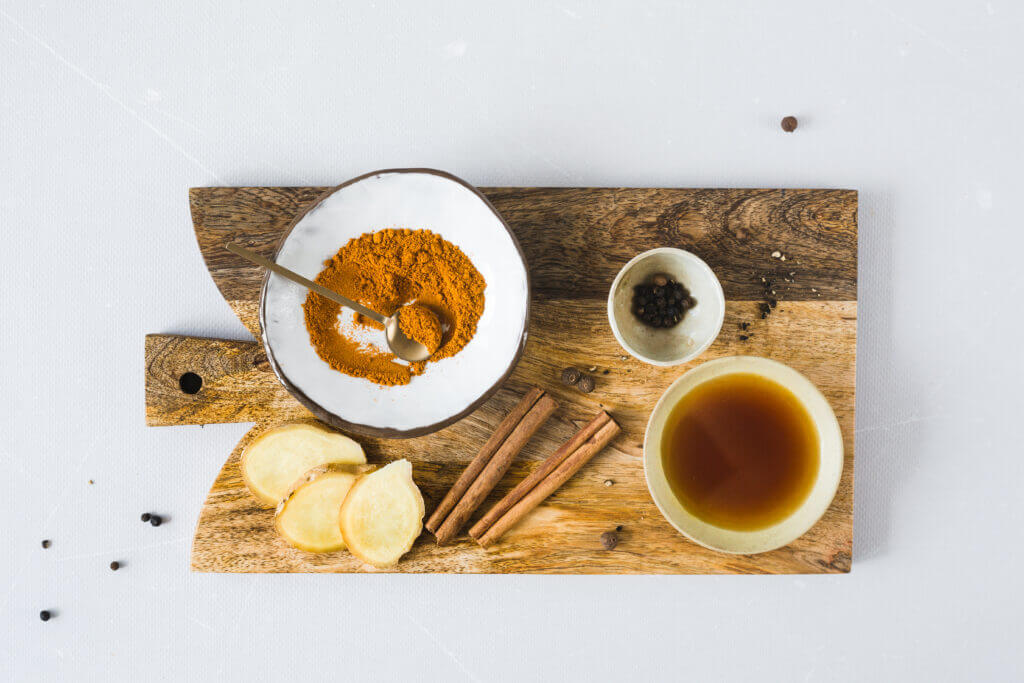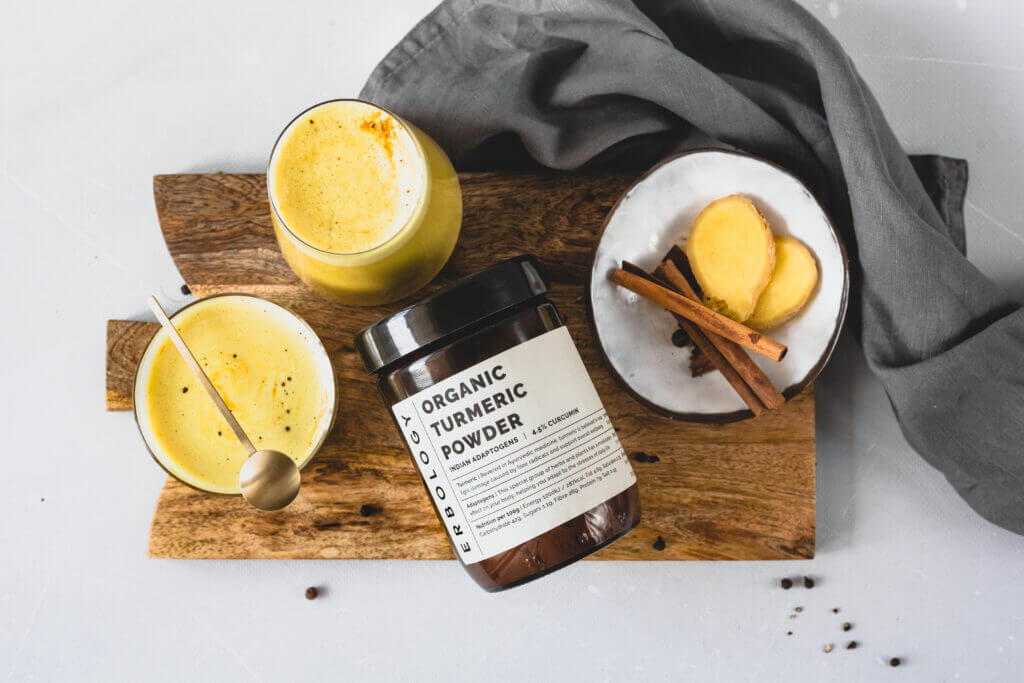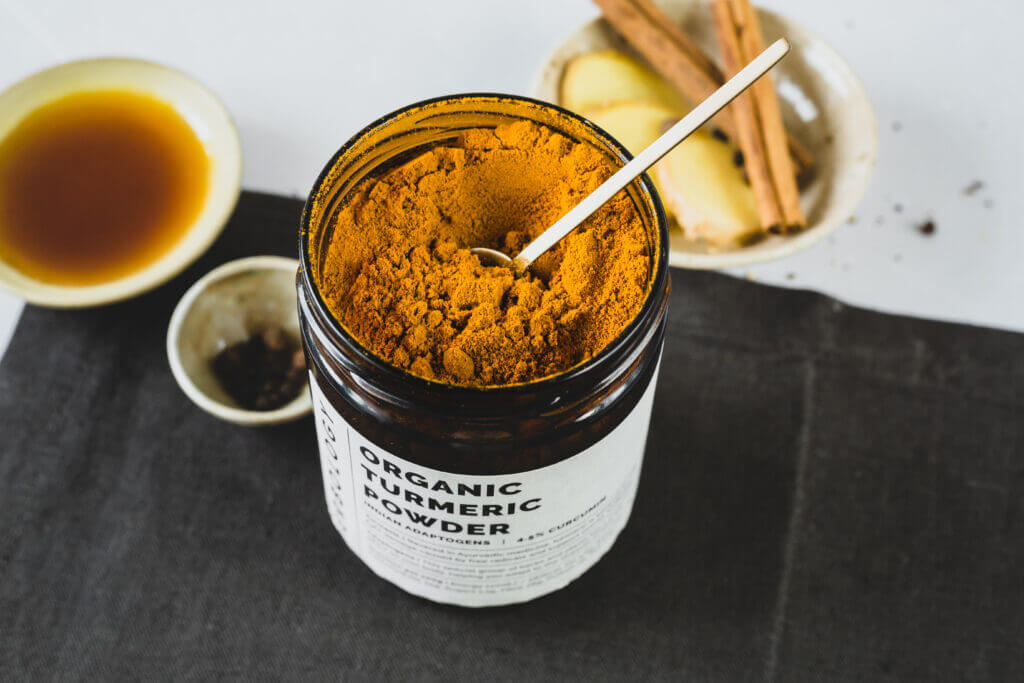Golden milk recipe with turmeric
- 1

undefined 5'

undefined 7'

undefined

undefined
- 1

undefined 5'

undefined 7'

undefined

undefined
The origins of golden milk
The phrase ‘golden milk’ is a new name for a very old idea. While you might see lots of photogenic images of golden milk popping up on your Instagram feed, or spy a turmeric latte on the menu at your local coffee shop, these are modern incarnations of a rather venerable drink.
The original name for golden milk is ‘haldi doodh’. It is a traditional Indian drink which is rather more straightforward than the intricately decorated golden milks of Instagram!
Rather, haldi doodh can be as simple as adding a pinch of turmeric to your warm milk. Traditionally, it is served to treat ailments such as colds and to preserve general good health.
As with so many traditional remedies, it has taken us a long time to catch on in the West. The golden milk (or turmeric latte) trend only arrived with us around five years ago, in a boom of health blogs and social media posts.
There is no difference between a golden milk and a turmeric latte beyond nomenclature; both are completely caffeine-free and can be enjoyed at any time of day.

The golden touch
Of course, the star of the show in our golden milk recipe is the turmeric. Not only does it impart the beautiful colour, but it is also responsible for the health benefits of the drink.
In traditional medicines such as Ayurveda and TCM (Traditional Chinese Medicine), turmeric is used to treat a variety of health problems.
Ayurveda recommends turmeric to treat respiratory conditions as well as a runny nose, cough and sinusitis.(1)
Meanwhile, TCM makes use of turmeric in sprains and swellings, as well as to treat abdominal pain.(1)
In the modern day, scientific research has identified several health properties of turmeric. It has anti-inflammatory, anti fungal and antimicrobial properties and is an effective antioxidant. It may also help with healthy digestion.(1)
Check our article for more on turmeric’s impressive health benefits.
Many of turmeric’s health qualities are thought to be linked with a particular bioactive compound, called curcumin.

The importance of black pepper
There are myriad recipes out there for golden milk, and our recipe is certainly open for tweaking. We encourage experimentation with the flavours and spices you most prefer.
You could also swap our Organic Almond Flour for dairy, oat or soy milk if you are sensitive to nuts.
However, there is one flavouring we’d encourage you to keep: black pepper.
Not only do these two spices have complementary flavours, adding black pepper to your drink will actually make it better for you.
This is because curcumin, the active compound in turmeric, has ‘low bioavailability’. In essence, it’s quite difficult for our bodies to absorb it,
However, black pepper also has an active component called piperine. Research has shown that when curcumin and piperine are consumed together, the bioavailability of curcumin increases by up to 2000%.(2)
Thus, if you want to get the best from your latte, make sure to keep the black pepper.
Turmeric is an adaptogen
Turmeric is such a popular spice, used to add flavour and colour to so many dishes, that it’s easy to forget it’s an adaptogen too.
Adaptogens are a special family of herbs and plants which help your body cope with physical and mental stresses.
Other adaptogens include ashwagandha, triphala, and medicinal mushrooms such as reishi and lion’s mane.
While all adaptogens can help with stress in general, they each have their own strengths as well.
One scientific study, conducted on mice, found that curcumin from turmeric may be especially good at helping us deal with chronic and ‘unpredictable’ stress.
The researchers suggested that this may be because of turmeric’s antioxidant capacity, and the fact that it seems to moderate the release of a certain ‘stress chemical’ called corticosterone.(3)
In short, turmeric may be the perfect adaptogen for you if you’re feeling generally stressed out, or find it hard to switch your mind off when you go to bed.

How to enjoy
Golden milk - at least in the Western sense - is usually drunk before bed as a way of winding down.
It contains no caffeine, making it a great alternative to tea and coffee as bedtime approaches.
However, you can enjoy a golden milk at any time of day. Many people enjoy it in the morning, replacing their usual latte with a turmeric version!
As with all adaptogenic herbs, turmeric takes a while to show off its health benefits. We recommend taking turmeric daily for up to eight weeks for best results. Take a short break afterwards to give your body time to ‘rest and reset’.
- 250 ml hot water
- 1 tbsp Erbology Organic Almond Flour
- ½ tsp Erbology Organic Turmeric Powder
- ⅓ tsp vanilla extract
- 2cm slice of ginger, peeled
- ⅔ tsp virgin coconut oil
- ⅛ tsp ground nutmeg
- 2-3 black peppercorns
- ½ tsp ground cinnamon
- 2 tsp maple syrup
- Small pinch of sea salt
- Size: 130 g
- Serv. size: 3 g
- Place all the ingredients in a high speed blender and blend well until smooth and creamy.
- Transfer to a serving cup and enjoy!